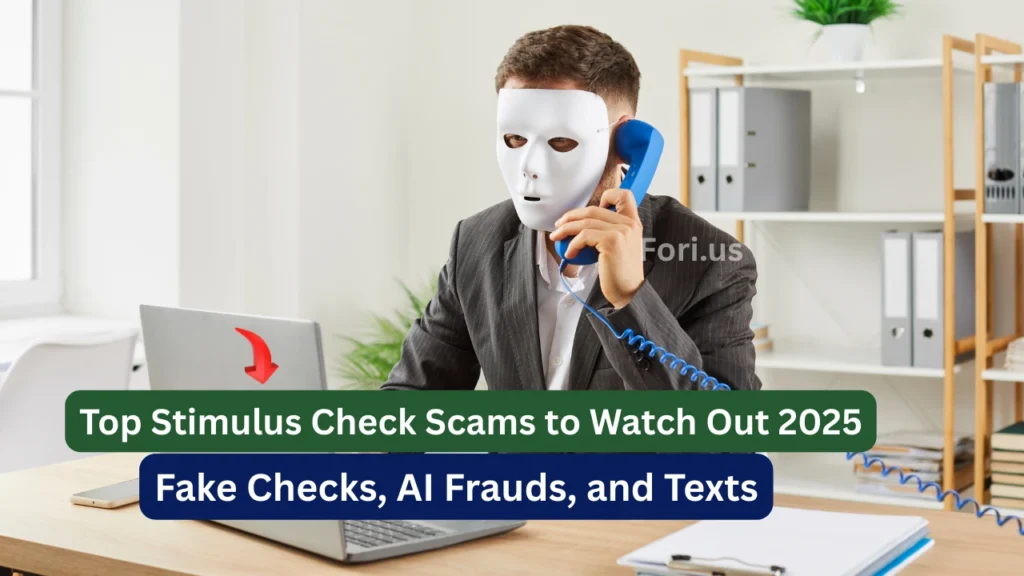Top Stimulus Scams 2025- With new relief talks in 2025 creating uncertainty, scammers are exploiting the situation. Knowing that many people are desperate for financial aid, they send out fake messages, emails, calls, and even use AI-generated tricks to deceive victims.
The Top Stimulus scams range from fake checks and phishing emails to bogus phone calls and AI-driven deepfakes. By understanding how these schemes operate, Americans can better protect their personal data and finances.
Google to Pay $8.75M in Chromebook Privacy Lawsuit in Illinois
Top Stimulus Scams 2025 Highlights
| Key Issue | Scam Example | Protection Tip |
|---|---|---|
| Fake Texts | Texts that say “stimulus approved” and provide a link | Avoid clicking on links from unverified numbers |
| Counterfeit Checks | Overpayment “refunds” after you deposit a fake check | Confirm with your bank before returning any money |
| Phishing Emails | Emails imitating IRS/Treasury to get data | The IRS does not email for sensitive details |
| AI Fraud | Voice clones or fake videos of officials/relatives | Hang up and call back on official numbers |
| Social Media Ads | Posts offering “instant stimulus payouts” | Legitimate programs are not promoted on social media |

Why Stimulus Scams Surge During Relief Talks
Each time new financial aid is debated, delays in official announcements create room for scammers to spread misinformation and trick the public.
Fraudsters claim they can get you early payments or guarantee faster access, but in reality, legitimate government programs never require fees, nor do they send unsolicited texts or emails asking for personal details.
Social Security Benefit Suspension: What Retirees Should Know
Most Frequent Stimulus Scams Seen in 2025
1.Scam Text Alerts
Fraudsters send text messages saying your stimulus has been approved. Clicking their link takes you to a fake site designed to steal Social Security or bank details.
Tip: Delete suspicious texts. Check information only on verified government domains that use “.gov”
2. Counterfeit Checks
Criminals mail checks that look authentic, often with government logos. After you deposit, they claim you received too much and demand a refund. Later, the bank declares the check fraudulent, and you lose the money.
Tip: If you get an unexpected check, speak with your bank before doing anything.
3. Phishing Emails
Phishing emails are crafted to look like official IRS or Treasury notices, asking people to provide sensitive personal information. They often use logos or addresses that appear genuine.
Tip: The IRS will not contact you by email for personal details. Flag questionable messages and remove them from your inbox
Government $250 Checks: Millions Could Claim Bigger Payouts
4. Fraudulent Phone Calls
Fraudulent callers pose as government representatives, pushing people to hand over Social Security numbers, bank details, or other private data. Some even use partial real information to sound convincing.
Tip: If someone claims to be from the IRS or federal agencies, hang up and call official numbers directly.
5.Fraudulent Social Media Posts and Online Promotions
Scam posts on platforms like Facebook, WhatsApp, or Instagram advertise fake “early stimulus money” opportunities. Clicking those links usually leads to fraudulent sites.
Tip: Federal programs are not announced or processed through social media ads.
6. Impersonation of Local Officials
Fraudsters may pose as state or city officials, contacting people to “verify” eligibility. They gain trust by using the names of real agencies.
Tip: Always confirm information through your state’s official website.
7. AI-Powered Frauds and Deepfakes
AI tools are now being abused by scammers to copy voices or produce fake videos of well-known individuals. In some cases, they pretend to be family members in urgent need of money.
Tip: If something feels unusual, confirm directly with the person through a trusted number.
8. Advance Fee and Fast-Track Offers
Certain schemes claim they can release your stimulus check faster if you pay a so-called “processing charge.” These payments are often requested through gift cards, apps, or cryptocurrency.
Tip: No legitimate stimulus program requires a fee.
Recognizing Red Flags
Ask yourself these questions before responding to any stimulus-related message:
- Did it come from an official
.govaddress or source? - Is the sender trying to rush me into acting immediately?
- Am I being asked for Social Security, banking, or login details?
- Is the promise unusually generous or unrealistic?
If you find yourself answering “yes” to these, you’re probably dealing with a scam.
Ways to Stay Safe from Stimulus Scams
- Rely only on official government websites like IRS.gov for updates.
- Never give out banking information, SSNs, or login details to unknown contacts.
- Block and report suspicious texts, emails, or calls.
- Educate older relatives, since seniors are frequent targets.
- Report scams to the Federal Trade Commission (FTC) or IRS immediately.
FAQs
Counterfeit checks, scam emails, fake calls, and AI-powered frauds.
Victims receive fake checks, deposit them, and are asked to send back “excess” funds before the bank reveals the check is fraudulent.
No. The IRS does not send unsolicited emails, texts, or cold calls about payments.
Avoid clicking on unknown links—always confirm details through official government “.gov” websites.
Teach them about common scam tactics and encourage them to double-check messages before taking action.
The rise in counterfeit checks, phishing schemes, deepfake tricks, and fake calls in 2025 shows that scammers are now using more advanced methods than in the past. Staying alert and cautious is the best protection.
By recognizing warning signs, avoiding suspicious links, and confirming information only through official sources, Americans can defend themselves against fraud and make sure legitimate aid reaches those who truly qualify.
